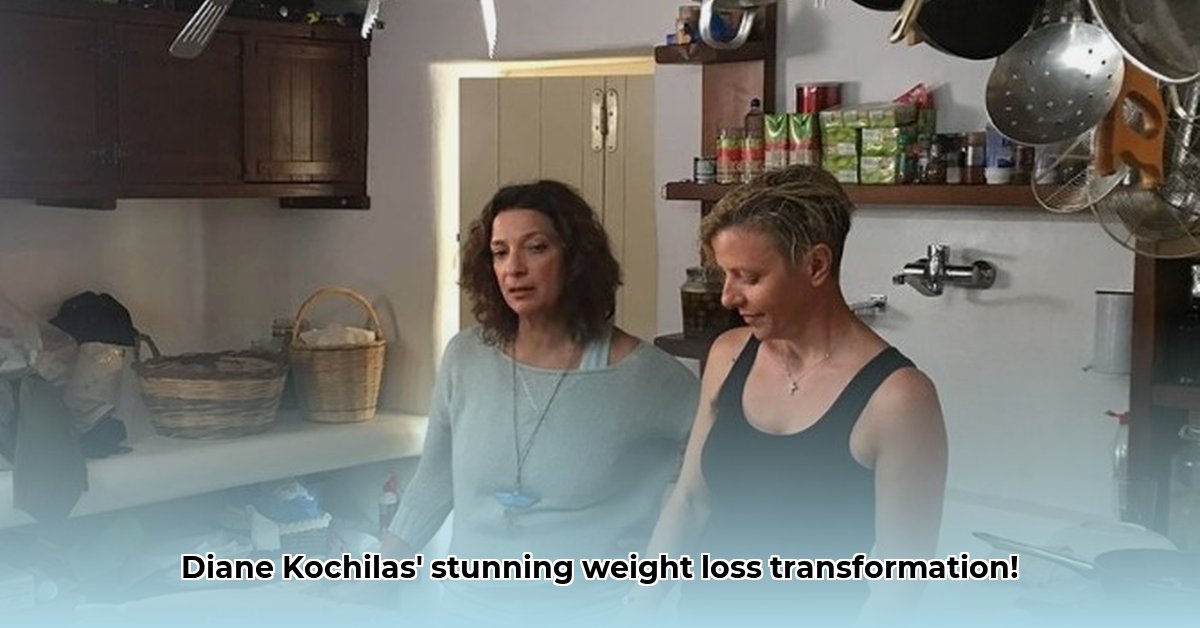
Diane Kochilas' Weight Loss Journey: A Transformative Experience
Renowned cookbook author and television personality, Diane Kochilas, recently underwent bariatric surgery, marking a significant turning point in her life. While details surrounding her personal experience remain largely private, her journey offers a compelling case study illustrating the potential benefits and challenges associated with weight loss surgery. This article explores her transformation, examining the procedure itself, and providing practical insights for individuals considering similar interventions. We'll also address the potential risks and the importance of long-term commitment to a healthy lifestyle.
Diane's Story: A Chef's Recipe for Health
Before undergoing surgery, Diane Kochilas demonstrated a considerable commitment to improving her health through diet and exercise. She reportedly lost 20 pounds in two months, highlighting her dedication to lifestyle changes before considering a more extensive intervention. This initial success underscores the importance of comprehensive pre-operative planning and commitment to a healthy lifestyle. Her journey, however, extended beyond weight loss, encompassing a profound emotional and mental transformation. It was a holistic approach, focused on rebuilding her well-being and improving the quality of her life, going beyond simply reaching a specific weight goal.
Understanding Bariatric Surgery: Gastric Bypass Explained
Diane Kochilas opted for gastric bypass surgery, a procedure that modifies the digestive system to reduce food intake and absorption. In a Roux-en-Y gastric bypass (RYGB), the surgeon creates a small stomach pouch and reroutes the food's path, bypassing a portion of the stomach and duodenum. This smaller pouch leads to faster satiety, meaning individuals feel full sooner with smaller portions of food. The procedure significantly impacts how the body processes food and absorbs nutrients. While potentially very effective for significant weight loss, it's imperative to understand that long-term success is heavily reliant on adopting and maintaining a healthy lifestyle after surgery.
Diane's Case: A Limited but Illustrative Perspective
While precise pre- and post-operative data regarding Diane Kochilas' weight and health measurements remain undisclosed, her reported significant weight loss and improved energy levels suggest the procedure's success in her case. The lack of detailed information, however, limits the ability to conduct a thorough analysis of her specific experience and draw definitive conclusions about the procedure's effectiveness in her unique circumstances. Further information regarding her pre-operative counseling, post-operative support, and nutritional guidance would be beneficial in creating a more comprehensive understanding of her journey.
Actionable Insights: Steps to Consider Before Bariatric Surgery
Considering bariatric surgery is a major decision requiring thorough research and consultation with multiple healthcare professionals. It's crucial to approach this with realistic expectations and a comprehensive understanding of the commitment required.
Thorough Consultation: Seek expert advice from several qualified surgeons and registered dietitians to compare opinions and ensure an informed decision.
Realistic Expectations: Understand that bariatric surgery is a tool, not a magic cure. Long-term weight management requires consistent lifestyle changes beyond the procedure itself.
Build a Support System: A strong support network of family, friends, or support groups is invaluable throughout the process.
Plan for Nutritional Changes: Work with a bariatric dietitian to develop a long-term plan for healthy eating habits that addresses potential nutritional deficiencies.
Assess Your Motivation: Ensure you possess the mental and emotional fortitude to navigate the challenges of recovery and long-term lifestyle changes.
Risks and Considerations: A Balanced View
Bariatric surgery, like any major operation, comes with potential risks, both short- and long-term. These can include surgical complications (infection, bleeding, leaks), nutritional deficiencies (vitamin B12, iron, calcium), and psychological adjustments (depression, anxiety). However, many of these risks can be mitigated through proper pre- and post-operative care, experienced surgeons, and a dedicated commitment to a healthy lifestyle.
Conclusion: A Holistic Approach to Well-being
Diane Kochilas' journey underscores the transformative potential of bariatric surgery for some individuals. It's vital to remember that every individual's experience is unique, emphasizing the importance of personalized care. While bariatric surgery can be a valuable tool, a holistic approach encompassing dietary changes, regular exercise, and strong emotional support is crucial for achieving and maintaining long-term health and well-being.